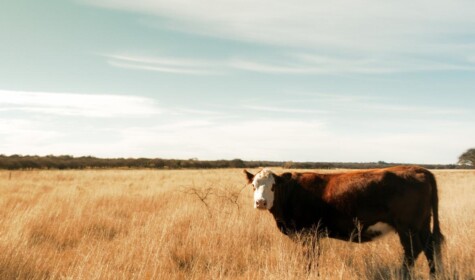The Sustainable Food Trust (SFT) has welcomed the latest report from the Intergovernmental Panel on Climate Change (IPCC) which focuses on how to reduce greenhouse gas emissions [1]. Despite repeated warnings, emissions of all major greenhouse gasses are continuing to increase, and the report outlines in stark terms the scale and urgency of the challenge we face to achieve a 43% reduction in emissions within the next eight years.
Agriculture is a significant source of emissions, but it has good potential to reduce these. Storing more carbon in soils, particularly where these have been degraded, is recognised as the fourth most significant mitigation option across all sectors of the economy (behind wind, solar, and preventing deforestation) [2]. The SFT strongly agrees with the acknowledgement that agroecological farming methods can help reduce emissions and sequester carbon while also delivering a number of other benefits including food security, improved livelihoods, biodiversity and human health [3].
The SFT believes reductions in meat consumption are needed, but wants to see these take place with meat from livestock systems that provide little or no wider benefits to society and also depend heavily on grain which humans could be eating instead. We also welcome the report’s recognition of the complex relationships between livestock, climate change and other key issues. This includes an acknowledgement that grazing animals have an important social, cultural and environmental role to play in the developing world, on land unsuited to crop production and in certain pastoral landscapes. In these situations, livestock make an important contribution to food security and human nutrition, and reduce demand for arable land [4].
Although methane emissions from agriculture are considerable [5], the report makes clear that energy supply is responsible for between 22% and 42% of anthropogenic methane emissions, in addition to its major contribution to CO2 emissions. It also points out that technologies already exist to reduce this by 50% to 80% [6].
SFT policy director, Richard Young, said, “It’s high time politicians replaced promises with action. Every day we delay, we make the challenge that much greater. In terms of agriculture, we need to see a much faster transition to regenerative farming methods. The SFT is also aware of the need to reduce methane emissions from cattle, sheep and intensive livestock manures. The first things to do in this respect is to prevent livestock numbers from continuing to increase at the global scale, especially where this is linked to deforestation. Further research is needed into breeding programmes and vaccines, which appear at present to offer the safest and most promising ways to reduce ruminant methane emissions overall.”
The issues relating to methane are complex. Research shows that the current method for assessing methane overstates its impact on global warming in situations where emissions are stable or falling [7] and that to achieve net zero methane requires only a 10% reduction by 2050, whereas we must completely stop adding additional CO2 to the atmosphere by then. [8] This is because methane breaks down within 10-12 years, whereas CO2 emissions remain in the atmosphere and build up indefinitely. However, because fossil fuel use may not be reduced as quickly as needed, the UK government has pledged to work with other countries to achieve a 30% reduction in global methane emissions by 2030 [9]. Most of this could be achieved by the oil, gas and coal industries with existing technologies, but a range of feed additives are under development to help reduce emissions from ruminants, as well as breeding programmes which identify and then breed from animals with naturally lower methane emissions. The potential to develop vaccines which reduce methane emissions has also been identified.
ENDS
For further information or comment please contact:
Richard Young, Policy Director at the Sustainable Food Trust
richard@sustainablefoodtrust.org
07919194235
Megan Perry, Head of Policy and Campaigns at the Sustainable Food Trust
megan@sustainablefoodtrust.org
07761804341
Notes for editors
- Climate Change 2022: Mitigation of Climate Change, https://www.ipcc.ch/report/ar6/wg3/
- Summary for policy makers: https://www.ipcc.ch/report/ar6/wg3/figures/summary-for-policymakers/figure-spm-7
- The report states, ‘Agroecological approaches can be integrated into a wide range of land management practices to support a sustainable bioeconomy and address equity considerations (HLPE 2019). Relevant land-use practices, such as agroforestry, intercropping, organic amendments, cover crops and rotational grazing, can provide mitigation and support adaption to climate change via food security, livelihoods, biodiversity and health co-benefits’ (AR6 WG III, Full Report, Chapter 12, p.114)
- The report states, ‘In traditional production systems, especially in developing countries, livestock serve multiple functions, providing draught power, fertiliser, investment and social status, besides constituting an important source of nutrients (Weiler et al. 2014). In landscapes dominated by forests or cropland, semi-natural pastures grazed by ruminants provide heterogeneity that supports biodiversity (Röös et al. 2016). Grazing on marginal land and the use of crop residues and food waste can provide human-edible food with lower demands for cropland (Röös et al. 2016; van Zanten et al. 2018; Van Hal et al. 2019)’ (AR6 WG III, Full report, Chapter 12, p.71)
- AR6 WG III, Full report, Chapter 12
- AR6 WG III, Summary for Policymakers, C.4.5
- Commins, B (2020) What is “net zero” for methane? Reading University https://blogs.reading.ac.uk/weather-and-climate-at-reading/2020/what-is-net-zero-for-methane/
- Cain, M, Allen M, and Lynch, J Net Zero for Agriculture, https://www.oxfordmartin.ox.ac.uk/downloads/academic/201908_ClimatePollutants.pdf
- Global Methane Pledge -Fast action on methane to keep a 1.5 degree C future within reach, https://www.globalmethanepledge.org/
About the Sustainable Food Trust:
The Sustainable Food Trust is a registered charity that was founded by Patrick Holden in 2011 in response to the worsening human and environmental crises that are associated with the vast majority of today’s food and farming systems. Our vision is for food and farming systems which nourish the health of the planet and its people. Our mission is to accelerate the transition to more sustainable food and farming systems globally.



